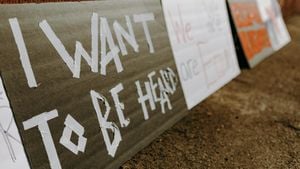Police clashed with protesters on the streets of Tbilisi, Georgia's capital, amid rising tensions following last month’s contentious parliamentary election results, which many citizens claim were manipulated. This disturbance unfolded as demonstrators assembled near Tbilisi State University, setting up tents and roadblocks to demand the annulment of the Oct. 26 elections, which saw the ruling Georgian Dream party declared the winner. Protesters took to the streets under the banner of opposition parties, alleging widespread electoral fraud and voter intimidation.
Reports indicate the election gave Georgian Dream approximately 54% of the vote, securing 89 of the 150 seats available in parliament. Opposition leaders have gone so far as to claim these results are statistically implausible, calling the election process rigged, which has prompted immediate public outcry. The protests are reflective of broader concerns over Georgia’s democratic integrity and its ties to the European Union versus Russia, with many voters viewing the election as pivotal to the country's future direction.
The unrest has persisted since the election outcome was announced, with demonstrations intensifying after the Central Election Commission validated the results. Elene Khoshtaria, leader of the Coalition for Change, criticized the ruling party for its increasing authoritarian tendencies and vowed to continue protesting until changes are enacted. "We are fighting for the votes of the people and struggling for Georgia’s European future," Khoshtaria stated, emphasizing the need for public resistance against the perceived injustice.
This past week, police forcibly dismantled makeshift camps established by demonstrators, arresting at least sixteen individuals amid violent clashes. Video footage revealed police utilizing pepper spray and physically confronting protesters, indicating the lengths authorities are willing to go to quell dissent. The Ministry of Internal Affairs released statements justifying the police action, alleging protesters had unlawfully obstructed traffic.
Opposition parties have called for daily protests leading up to the next session of parliament, which is expected to convene later this month. With President Salome Zourabichvili, who has publicly contested the election results, filing legal challenges against the electoral outcome, there’s speculation about potential shifts within Georgia’s political framework. This legal endeavor, which argues violations of voting rights, reveals the power struggle within Georgia's political sphere.
The discontent isn't just rooted in the results but is also fueled by the growing perception of Georgian Dream's ties to Russia, leading critics to argue the party could undermine the nation's aspirations for EU integration. Anti-government sentiments have gained traction amid accusations of corruption and authoritarianism connected to the party's founder, Bidzina Ivanishvili, who has faced scrutiny over his past business dealings.
Western observers, including the European Union, have also echoed calls for investigations, particularly concerning the irregularities reported throughout the electoral process. Various rights groups highlighted instances of ballot stuffing, intimidation, and bribery, urging political reforms to strengthen democracy within the nation.
The political environment has become increasingly precarious. Opposition leaders, buoyed by public support, are determined to maintain their visibility, promising to carry their protests forward as long as it takes to secure justice and transparency. "This is just the beginning of our resistance," Khoshtaria affirmed, signaling the resolve among the protesters to challenge the status quo.
Prominent figures within the opposition have linked the current environment to historic struggles for democratic freedoms. Many citizens turned out to raise EU flags during protests, emphasizing their desire for closer ties with European institutions rather than falling under Russia’s shadow. For many Georgians, the elections did not just represent a political choice but rather the overall direction the country is headed—either toward European integration or drifting back toward Russia.
Despite the challenges, the spirit of dissent continues to grow, evidenced by the crowds willing to face down police forces. The intense emotional atmosphere around these protests indicates how much is at stake for both supporters of Georgian Dream and its opponents. Public sentiment, inherently tied to notions of national identity and aspirations for the future, seems to be mobilizing people from various walks of life to join the call for change.
November has already seen police attempting to quash peaceful demonstrations with force, but each clash only seems to invigorate opposition resolve. With President Zourabichvili highlighting alleged violations of fundamental voting rights, the coming weeks will be telling as tensions escalate and public demonstrations show no signs of abatement. The government’s next steps could very well dictate the future of democracy within Georgia.
Throughout this ordeal, the public continues to rally, united by hopes of reform and aspirations for their country’s future within the European sphere. The chorus of voices demanding accountability reflects broader desires for genuine democratic processes, free expression, and international partnership—core ideals increasingly under threat, according to various critics of the governing body.
Protests, driven by the need for change, have pushed political leaders to either reevaluate their positions or risk alienation from the citizenry. For Georgians, the upcoming parliamentary session could serve as both the litmus test for the current administration’s legitimacy and as the first step toward realizing their aspirations for democracy.
The resilience shown by the citizens of Georgia during these turbulent times speaks volumes about their commitment to fight for their rights and shape the future of their nation. The struggle now lies within the halls of power, where the justifications for the electoral extension of Georgian Dream are being rigorously contested, and where the promise of democratic ideals continues to ignite fiery passions among the populace.
Will subsequent weeks reveal genuine political reforms, or will the continued protests sharpen the divide between dissenters and the ruling party? Only time will tell, but for many Georgians, the fight for their rights has just begun, raising questions about the resilience of democracy itself within the country.
This saga mirrors other global struggles, reminding everyone of what’s at risk when elections are deemed illegitimate, and of the lengths ordinary citizens are prepared to go for their beliefs. While Georgia grapples with its identity, it also stands as part of larger narratives surrounding democracy and accountability across the globe, echoing sentiments of resistance and hope.



